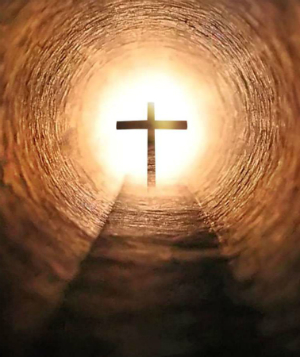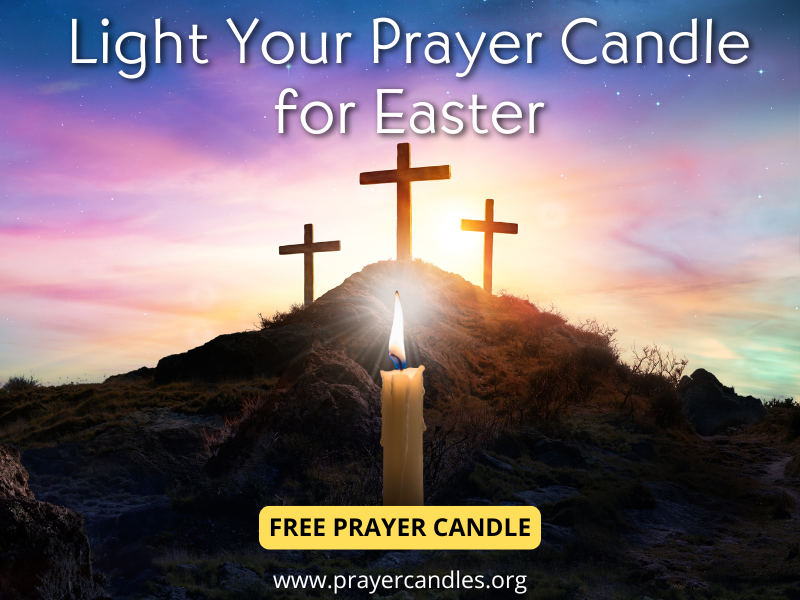Who Is God? A Holy Week Reflection
Want to know who God is? That answer will not come easily, for it involves sacrifice and death to self. There are no shortcuts; there are no "techniques" to learn. However, as Blessed John Paul II often said, "Be not afraid!" For Christ himself has died for us. Set sail on the journey of the interior life of grace and the experience of God's presence within.

"Who is God?" That is the irrepressible question which lies at the center of every human heart, found in every culture of every age.
Highlights
Catholic Online (https://www.catholic.org)
3/26/2024 (1 year ago)
Published in Lent / Easter
Keywords: who is God, what is God, the experience of God, the personal God, Christ, Jesus our life, F. K. Bartels
GLADE PARK, CO (Catholic Online) -- "Who is God?" That is the irrepressible question which lies at the center of every human heart, found in every culture of every age; it is therefore a universal question. And it is a question of unparalleled importance.
Whether admitted or not, whether embraced of not, we cannot achieve our human fullness apart from seriously considering the question of who God is. To attempt to ignore or bury this question is futile; for it will again rise to the surface: "Where can I hide from your spirit? From your presence, where can I flee?" (Ps. 139:7). If we do not ardently seek to answer this highest and most pressing question, we shall have failed miserably, and thus remain stunted, incomplete, unsatisfied and pitifully unhappy.
Therefore to despise the question is to turn from light toward darkness; it is to trade infinite and lasting beauty for evanescent created objects; it is to stifle, reduce and even constrict the intellect and its exalted potential to one of an unfulfilled state of dreary isolation; it is to self-define our own being as less than fully human and thus grovel in the murky depths of a paltry, near beastly existence. Simply, we cannot achieve the exalted status for which God has destined us apart from answering this question. Therefore the goal of human nature is to do so.
However, some merely want to know what God is, as if defining God or understanding something of his attributes is satisfactory; but that is not enough. For to be fully human is to strive to not only answer this question, but go far beyond it, reaching into God himself through a participation in God's own divine life by the free gift of grace. Yes, we need -- in fact crave -- not to know simply what God is but rather who he is.
Given God's transcendence and complete lack of dependence on anything outside of himself, how is it possible for mere mortals to know the eternal, omnipotent and omniscient God who is Creator of all that is visible and invisible? Some would, therefore, insist that this question of "who is God?" is unanswerable. I beg to differ. If we look upon Christ crucified, the boundless yet paradoxical love of the infinite God for mere finite men is revealed in astonishing brilliance. In Christ the self-gift of God to mankind is unveiled. Indeed, we can hope to know God! For the Son of God assumed human flesh and became man: in these last days God has spoken to us by his Son, who "reflects the glory of God and bears the very stamp of his nature" (Heb. 1:2-3).
Lent: Answer The Question
The sacred season of Lent is precisely about learning who God is. As we enter into Holy Week, provided we do so fruitfully, we enter into the very life of God as we voluntarily choose of our own free will to participate in the Paschal Mystery; that is, as we immerse ourselves in the mysteries of the life of Christ, we become like God. This is not something we do metaphorically or only symbolically, rather it is something real: we are to become "little Christs."
But let us back up some. Answering the question of "who is God?" is not simply a matter of idle reflection or meditation; nor is it achieved in only gazing upon the wonders of creation; nor will this question be fully answered in the reading of Sacred Scripture only, and so forth. As important as these things can be, we must not attempt to answer this question in that spirit of subjectivity which insists upon our own ideas. For Christ himself has set before us a journey by which we are to come to know God.
What is this journey? It begins with God's call to us, which is a gift of grace. Here we recognize, however subtly or strongly, the need to "connect with" or know or belong to God. We begin to pray, to seek to enter into an intimate relationship with the divine Other through open disclosure of the secrets of our heart. We begin to look upon Christ with eyes of love. But that is not enough; for if we are to know who God is, it is necessary to become a member of the divine family.
St. Paul tells us that those who have been baptized are baptized into Christ Jesus (Rom. 6:3). Through the sacrament of Baptism we are purified of our sins, incorporated into Christ and the Church, and given the incomparable gift of the Holy Spirit (Acts 2:38-42). In 1 Peter we read that Baptism "now saves you" (3:21); in fact, the Lord himself affirms that Baptism is necessary for salvation (cf. Jn 3:5; CCC 1257). The two principal effects of this sacrament, the doorway to eternal life, are purification from sins and new birth in the Holy Spirit (CCC 1262). Baptism gives to us the gift of sanctifying grace by which we come to share in God's own life as adopted sons and daughters of the divine family.
There is a great deal that could be said here. But it is important to understand that this journey of which we are speaking is one of living a sacramental life in Christ as children of mother Church. It is the Catholic life of prayer and holiness, virtue and self-sacrifice, which includes the sacraments of Baptism, Reconciliation, and Eucharist. Answering the question of "who is God?" is thus not achieved by ignoring history or the Church. Rather, God reveals himself in history and through the Church. If we want to know God, we need believe the Church, for in a real way the Church is Christ, since she is his one body.
Learning who God is, then, is a way of life. It is a life infused with the theological virtues of faith, hope and charity, in which we assent in faith to all that God has revealed through the Church; we trust in hope that Christ will fulfill his promises; and we burn with a passionate, complete love for God above all else. We perceive God and know God because we belong to him: totally and entirely. That is ultimately the meaning of the spiritual life: to live in union with God, caught up forever in his fiery embrace of infinite, unmeasurable love.
However, there is a multitude of Christians who have apparently lost the capacity to perceive God. And knowing who God is, is all about an experience of the awareness of God. Pope Benedict XVI often calls our attention to this tragic situation when he speaks about how today many people live as if God does not exist. He is not merely speaking to unbelievers, atheists, agnostics and so forth, but rather to Christians. We could ask, what has happened? Perhaps, however, it is better to ask, what is to be done?
Repentance: The First Step In Returning To God
"I said: Here I am! Here I am! To a nation that did not call upon my name (Is. 65:1). Those whom I love, I reprove and chasten; so be zealous and repent. Behold, I stand at the door and knock; if any one hears my voice and opens the door, I will come in to him and eat with him, and he with me" (Rev. 3:19-20).
The great mystics and spiritual writers often refer to a "first conversion" that marks "beginners" in the spiritual life. This is the point on the journey at which, aided by actual grace, a baptized person realizes that he has strayed from the path of God's friendship and firmly re-adjusts his stride in the proper direction. Here a sincere, heartfelt repentance is experienced as the person encounters face-to-face the reality of who he is: a sinner in dire need of Christ:
"To acknowledge one's sin, indeed -- penetrating still more deeply into the consideration of one's own personhood -- to recognize oneself as being a sinner, capable of sin and inclined to commit sin, is the essential first step in returning to God... In effect, to become reconciled with God presupposes and includes detaching oneself consciously and with determination from the sin into which one has fallen. It presupposes and includes, therefore, doing penance in the fullest sense of the term: repenting, showing this repentance, adopting a real attitude of repentance -- which is the attitude of the person who starts out on the road of return to the Father" (John Paul II, Reconciliation and Penance 13).
We cannot know God apart from an interior attitude of deep and prayerful repentance that is manifested exteriorly through a change of behavior. We have to seek God fully and completely; it is then that the door is opened (see Lk 11:9). Like the lost son, we too must journey back to the household of the Father (see Lk 15:11 ff.), which presupposes the desire to do penance: Father, "I am no longer worthy to be called your son; treat me as one of your hired servants" (Lk 15:19). It is crucial to give ourselves entirely over in abandonment to Christ, to shun the worldly, and embrace the ascetic life of simplicity and mortification:
"Put off the old man that belongs to your former manner of life and is corrupt through deceitful lusts, and be renewed in the spirit of your minds, and put on the new man, created after the likeness of God in true righteousness and holiness" (Eph. 4:22-24).
Find God Through A Life Lived For Love of God
Again, the sacred season of Lent applies here, for its disciplines aid us in giving ourselves over to Christ. For instance, through prayer we are established in loving communication with Christ; through fasting we engage in voluntary and innocent acts of suffering in which we conform ourselves to the suffering Christ; and almsgiving is a form of self-sacrifice for the sake of another. The disciplines of Lent are integral aspects of the spiritual life, for they serve as conduits into a deeper experience of God by focusing our entire being on the "things of heaven," rather than on the "things of earth" (Col. 3:2), which, with the help of God's grace, leads us along the interior path of perfection toward our final end: eternal life with God.
It is no accident that little attempt has been made here to say much about who God is. That is because answering that question involves an intimate relationship with a Person; with a Someone, not merely a "something." Such a relationship is born and nourished by living one's life in a particular way: it is an interior life of holiness, humility and unceasing prayer, recreated with Christ and infused with the indwelling Spirit, docile to the compassionate and delicate movements of God in the soul. It is a life as a child of mother Church, as a son and daughter of God. It is the life of fidelity to Christ, always mindful of the self-gift of his sacred humanity on the Roman cross for our sake, in which we diligently strive to become like him: as "little Christs."
Want to know who God is? That answer will not come easily, for it involves sacrifice and death to self. There are no shortcuts; there are no "techniques" to learn. However, as Blessed John Paul II often said, "Be not afraid!" For Christ himself has died for us. Set sail on the journey of the interior life of grace and the experience of God's presence within. After perhaps some long difficulty and a number of trials, you will find that you have risen from the valley floor and tread lightly upon the heights, for the indwelling Spirit will have re-created you anew. Then your voice will join in unitive harmony with the Song of Songs:
Let him kiss me with kisses of his mouth!
More delightful is your love than wine!
Your name spoken is a spreading perfume --
that is why the maidens love you.
Draw me!
We will follow you eagerly!
Bring me, O king, to your chambers. (1:2-4)
-----
Deacon F. K. Bartels is a Catholic writer who knows his Catholic Faith is one of the greatest gifts a man could ever receive. He is a contributing writer for Catholic Online. Visit him also at catholicpathways.com
---
'Help Give every Student and Teacher FREE resources for a world-class Moral Catholic Education'
Copyright 2021 - Distributed by Catholic Online
Join the Movement
When you sign up below, you don't just join an email list - you're joining an entire movement for Free world class Catholic education.

-

- Stations of the Cross
- Easter / Lent
- 5 Lenten Prayers
- Ash Wednesday
- Living Lent
- 7 Morning Prayers
- Mysteries of the Rosary
- Litany of the Bl. Virgin Mary
- Popular Saints
- Popular Prayers
- Female Saints
- Saint Feast Days by Month
- Pray the Rosary
The Way of the Cross: A Good Friday Reflection on Christ’s Final Journey
The Many Reasons Why We Call it Good Friday
“It Is Finished”: The Silence of Good Friday and the Triumph of the Cross
Daily Catholic
 Daily Readings for Saturday, April 19, 2025
Daily Readings for Saturday, April 19, 2025 St. Alphege: Saint of the Day for Saturday, April 19, 2025
St. Alphege: Saint of the Day for Saturday, April 19, 2025 Stewardship Prayer: Prayer of the Day for Saturday, April 19, 2025
Stewardship Prayer: Prayer of the Day for Saturday, April 19, 2025 Daily Readings for Friday, April 18, 2025
Daily Readings for Friday, April 18, 2025 St. Apollonius the Apologist: Saint of the Day for Friday, April 18, 2025
St. Apollonius the Apologist: Saint of the Day for Friday, April 18, 2025- Aspiration: Prayer of the Day for Friday, April 18, 2025
![]()
Copyright 2025 Catholic Online. All materials contained on this site, whether written, audible or visual are the exclusive property of Catholic Online and are protected under U.S. and International copyright laws, © Copyright 2025 Catholic Online. Any unauthorized use, without prior written consent of Catholic Online is strictly forbidden and prohibited.
Catholic Online is a Project of Your Catholic Voice Foundation, a Not-for-Profit Corporation. Your Catholic Voice Foundation has been granted a recognition of tax exemption under Section 501(c)(3) of the Internal Revenue Code. Federal Tax Identification Number: 81-0596847. Your gift is tax-deductible as allowed by law.






 Daily Readings for Saturday, April 19, 2025
Daily Readings for Saturday, April 19, 2025 St. Alphege: Saint of the Day for Saturday, April 19, 2025
St. Alphege: Saint of the Day for Saturday, April 19, 2025 Stewardship Prayer: Prayer of the Day for Saturday, April 19, 2025
Stewardship Prayer: Prayer of the Day for Saturday, April 19, 2025 St. Apollonius the Apologist: Saint of the Day for Friday, April 18, 2025
St. Apollonius the Apologist: Saint of the Day for Friday, April 18, 2025


